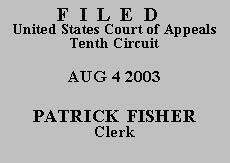

| JIMMY L. STROZIER, |
|
| v. | |
| JACK POTTER, Postmaster General, United States Postal Service, |
Plaintiff is employed by the United States Postal Service (USPS). Defendant Jack Potter is Postmaster General of the United States. Plaintiff alleges that he suffered race and sex discrimination in the workplace, and that he was retaliated against for engaging in activity protected by Title VII. Plaintiff initially filed an informal complaint about the alleged discrimination with the USPS's Equal Employment Opportunity (EEO) office and began pursuing his complaints through the USPS's internal process. On February 19, 2002, however, Plaintiff withdrew his EEO complaint. That same day he filed a motion in federal district court under 28 U.S.C. § 1915, seeking leave to proceed in forma pauperis with a civil lawsuit. His pro se complaint was filed on February 26.
Defendant moved under Federal Rule of Civil Procedure 12(b)(1) to dismiss Plaintiff's complaint for lack of subject matter jurisdiction, arguing that Plaintiff had failed to satisfy the jurisdictional prerequisite of exhausting his administrative remedies prior to filing suit. See Khader v. Aspin, 1 F.3d 968, 970-71 (10th Cir. 1993). The matter was referred to a magistrate judge, who recommended that Plaintiff's case be dismissed based on the jurisdictional defect noted by Defendant. The magistrate judge also recommended that Plaintiff be denied leave to amend his complaint. Plaintiff filed timely objections to the magistrate judge's report and recommendation. The district court rejected those objections, adopting the report and recommendation and dismissing Plaintiff's case with prejudice.
On appeal Plaintiff does not challenge the district court's decision regarding his failure to exhaust administrative remedies. He argues only that the court erred by dismissing his claim with prejudice, contending that dismissals for lack of subject matter jurisdiction should be without prejudice. We agree.
A district court's dismissal for lack of subject matter jurisdiction should be without prejudice. See Hernandez v. Conriv Realty Assoc., 182 F.3d 121, 123-24 (2d Cir. 1999) ("Article III deprives federal courts of the power to dismiss a case with prejudice where federal subject matter jurisdiction does not exist."); In re Orthopedic "Bone Screw" Prod. Liab. Litig., 132 F.3d 152, 155 (3d Cir. 1997) ("If a case, over which the court lacks subject matter jurisdiction, was originally filed in federal court, it must be dismissed. . . . The disposition of such a case will, however, be without prejudice."); cf. Hollander v. Sandoz Pharm. Corp., 289 F.3d 1193, 1216-17 (10th Cir. 2002) (dismissal for lack of personal jurisdiction should be without prejudice). Thus, we REVERSE the district court's dismissal with prejudice and REMAND with instructions to dismiss Plaintiff's case without prejudice.
ENTERED FOR THE COURT
Harris L Hartz
Circuit Judge
*.After examining the briefs and appellate record, this panel has determined unanimously that oral argument would not materially assist the determination of this appeal. See Fed. R. App. P. 34(a)(2); 10th Cir. R. 34.1(G). The case is therefore ordered submitted without oral argument. This order and judgment is not binding precedent, except under the doctrines of law of the case, res judicata, and collateral estoppel. The court generally disfavors the citation of orders and judgments; nevertheless, an order and judgment may be cited under the terms and conditions of 10th Cir. R. 36.3.